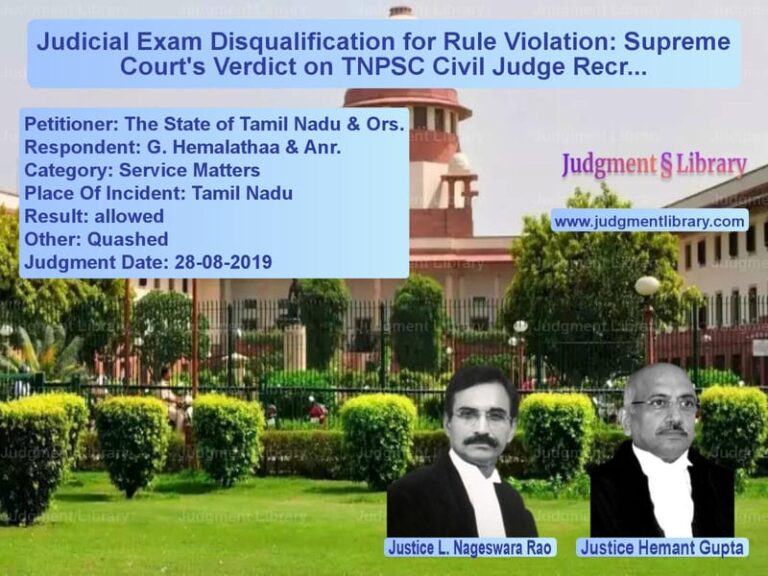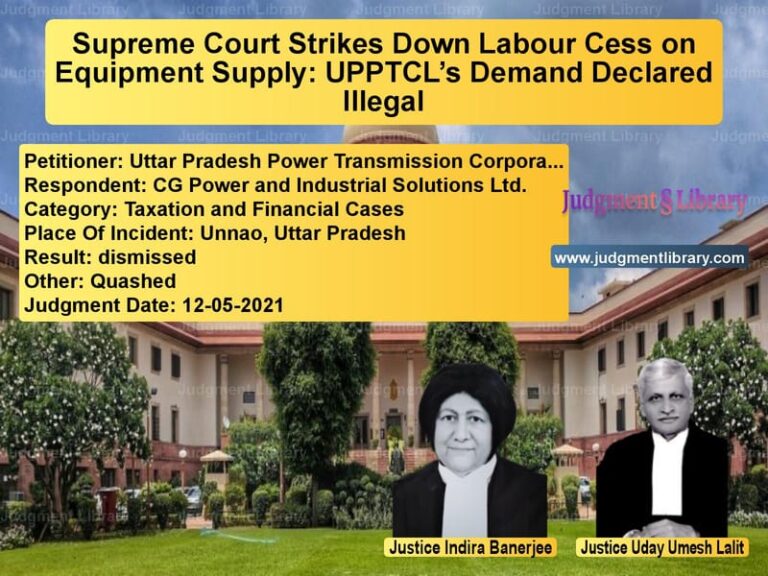Turnover Tax and Constitutional Validity: Supreme Court Upholds Karnataka Sales Tax Act
The case of M/s. Achal Industries vs. State of Karnataka is a landmark ruling concerning the interpretation of turnover tax under the Karnataka Sales Tax Act, 1957. The Supreme Court of India, in its judgment dated March 28, 2019, examined whether the levy of turnover tax under Section 6-B of the Act was constitutionally valid and whether the tax should be calculated based on total turnover or taxable turnover.
The case arose when M/s. Achal Industries, a manufacturer and registered dealer of cashew kernels and cashew shell oil, challenged the Karnataka Sales Tax Department’s interpretation of the term ‘total turnover’ and claimed that the tax should only be applied to taxable turnover. The Supreme Court, after reviewing the constitutional provisions and precedents, upheld the validity of the tax levy on total turnover.
Background of the Case
The dispute originated from the assessment years 1990-91 to 1999-2000, where M/s. Achal Industries was taxed under Section 6-B of the Karnataka Sales Tax Act. The key contentions were:
- The company was a registered dealer engaged in manufacturing and selling cashew products.
- The Sales Tax Department assessed turnover tax on total turnover rather than taxable turnover.
- The company argued that total turnover included transactions that were not taxable, such as inter-state sales and exports.
- It challenged the assessment before the Karnataka High Court, which ruled in favor of the State.
- The company then appealed to the Supreme Court, arguing that the tax should only be levied on taxable turnover.
Legal Issues Raised
- Whether turnover tax under Section 6-B of the Karnataka Sales Tax Act should be levied on total turnover or only on taxable turnover.
- Whether taxing total turnover violated Article 286 of the Constitution, which restricts state taxation on inter-state sales.
- Whether the levy of turnover tax was within the legislative competence of the State of Karnataka.
- Whether the inclusion of non-taxable transactions in total turnover amounted to an indirect levy on inter-state sales.
Arguments by the Petitioner (M/s. Achal Industries)
The appellant’s counsel argued:
- The tax should be levied only on taxable turnover and not on total turnover.
- Inter-state sales and export transactions could not be included in the calculation of turnover tax.
- The Karnataka High Court misinterpreted the constitutional limitations under Article 286.
- The levy of tax on total turnover indirectly violated the principles laid down in previous constitutional cases.
Arguments by the Respondent (State of Karnataka)
The State contended:
- The tax was legally imposed on total turnover as defined under Section 6-B of the Act.
- The High Court correctly upheld the validity of the tax based on the principle of economic superiority.
- The purpose of considering total turnover was to classify dealers into different tax slabs.
- There was no violation of Article 286 since the tax was applied as per the legislative competence of the State.
Supreme Court’s Judgment
The Supreme Court upheld the Karnataka High Court’s ruling, holding:
- The term ‘total turnover’ was clearly defined in the Karnataka Sales Tax Act.
- Turnover tax was levied based on total turnover to classify dealers and determine tax slabs.
- The tax did not directly levy inter-state sales but was a permissible classification mechanism.
- There was no constitutional violation as the tax was imposed within the legislative competence of the State.
The Court observed:
“The classification of dealers based on total turnover for determining tax rates is constitutionally valid. It does not amount to taxing inter-state sales, but rather identifies large dealers who can bear the burden of additional tax.”
Key Takeaways from the Judgment
- Turnover tax is legally levied on total turnover, not just taxable turnover.
- The tax does not violate constitutional restrictions on inter-state sales.
- Classification based on turnover is a valid mechanism for tax slabs.
- State legislatures have the competence to levy such taxes.
Conclusion
The Supreme Court’s ruling in M/s. Achal Industries vs. State of Karnataka clarifies the scope of turnover tax under the Karnataka Sales Tax Act. The judgment reinforces the constitutional validity of taxing total turnover and ensures uniform tax classification for dealers. The ruling serves as a precedent for interpreting state sales tax laws across India.
Petitioner Name: M/s. Achal Industries.Respondent Name: State of Karnataka.Judgment By: Justice Abhay Manohar Sapre, Justice Dinesh Maheshwari.Place Of Incident: Karnataka.Judgment Date: 28-03-2019.
Don’t miss out on the full details! Download the complete judgment in PDF format below and gain valuable insights instantly!
Download Judgment: Ms. Achal Industrie vs State of Karnataka Supreme Court of India Judgment Dated 28-03-2019.pdf
Direct Downlaod Judgment: Direct downlaod this Judgment
See all petitions in Income Tax Disputes
See all petitions in Tax Evasion Cases
See all petitions in Judgment by Abhay Manohar Sapre
See all petitions in Judgment by Dinesh Maheshwari
See all petitions in dismissed
See all petitions in Declared Infructuous
See all petitions in supreme court of India judgments March 2019
See all petitions in 2019 judgments
See all posts in Taxation and Financial Cases Category
See all allowed petitions in Taxation and Financial Cases Category
See all Dismissed petitions in Taxation and Financial Cases Category
See all partially allowed petitions in Taxation and Financial Cases Category







